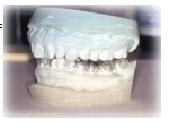I visited our dentist for my oral prophylaxis last saturday...then i remebered that i have to ask her if she was a tmj specialist ( a request from my SIL coz she has been scouting for one). Upon mention of tmj, she told me right there that i might have tmj disorder...i have all the symptoms...no wonder i was always sufferring from headaches, but contributed it to sinusitis...most often, i also suffer from neck pains, occassionally, i'd go deaf...i've experienced shoulder pains and back pains...all these are symptoms of tmj disorder.
But to make sure, she asked me to have a Lateral Cephalometric x-ray and a TMJ Radiograph x-ray which i complied...but i still hope it's not.
TMJ disorder, a dysfunction of the temporomandibular joint (which connects the lower jaw to the skull) can cause a wide variety of painful symptoms.
What is TMJ Syndrome? Temporomandibular joint (TMJ) syndrome, also called myofascial pain dysfunction, is a general term for a number of muscle, joint, and nerve symptoms that seem to be related to disturbance or disease in the temporomandibular joint. TMJ syndrome is a fairly common condition, perhaps because so many of the symptoms seem to be at least partly stress-related, and modern life is notably characterized by innumerable stressors.
What is the temporomandibular joint? The temporomandibular joint is the joint that connects the lower jaw (the mandible) to the skull.
What are the symptoms of TMJ syndrome? TMJ syndrome can produce a wide array of seemingly unrelated symptoms:
--jaw pain
--chronic generalized facial pain (either a sharp pain or a dull ache)
--headaches
--earaches
--a loud roaring in the ears
--clicking or popping sounds when the jaw is opened
--difficulty in opening and closing the jaw
--difficulty, discomfort, or pain when biting or chewing
--neck, shoulder, chest, and back pain
--toothache
--dizziness
Read more...






















































